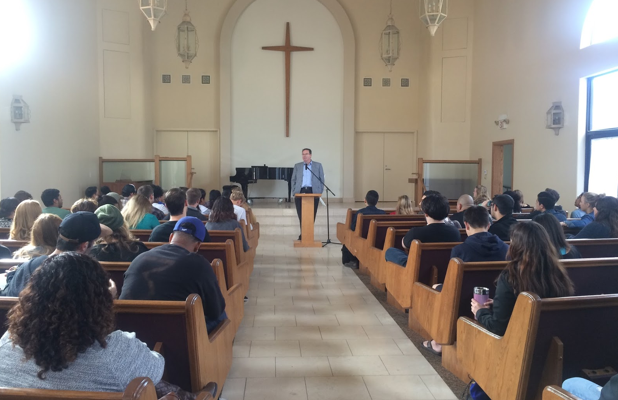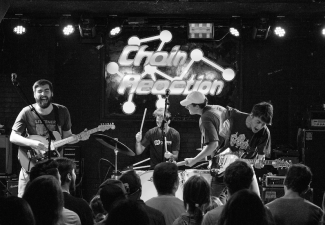President Michael Beals met with Vanguard students Friday morning to address concerns that arose after an increase in tuition. The price spike, which was announced in a campus wide email Wednesday morning, will be initiated next semester. Increased fees and course costs will cost students over $1,000 more a year to attend Vanguard. In addition, students will be required to purchase a parking pass if they would like to park their car on campus, a new policy that will charge $100 to traditional undergraduates and $50 to graduate and professional studies.
The president welcomed undergraduates, grad studies, and faculty alike into Needham Chapel in an open forum setting. Opening with a speech, he informed students that the tuition increase was necessary because utility costs are rising. The addition of $350 to the $100 service fee, he continued, was taken from the tuition and transferred to an outside charge to make tuition a rate honest to the academic costs.
President Beals focused his time on informing students exactly why tuition was raised: to keep our school competitive and to adjust to fixed costs. Council of Christian Colleges and Universities (CCCU) schools across the nation strive to become more appealing to students as this demographic group decreases in size. Vanguard, having missed its admissive goal by less than twenty students this last year, has tried to attract prospective students by freezing rates over the past four semesters. This year, however, the rise of utilities and similar services has pressed administration to raise prices once more. These services, or fixed costs, would be the recipient of increased revenues; funding for outside activities, services, and facilities were not included in the increase, a notion that students did not take well.
President Beals assured students that there are plans to revive the forensic team and the possibility of an event center were being discussed.
As the floor was opened up for student questions, varying topics arose. Overall, the biggest concern was money. What if students were not able to pay this boosted cost? Did the administration think the Vanguard community would be able to keep students here even if it drove them into debt? Would scholarships be increased as well? The president did his best to address each concern, though there were many instances where it may have seemed that the question had not yet been considered by the administration.
In response to the concern about no longer being able to afford college, Dr. Beals gave this scenario: by the end of one’s time at Vanguard, the average student will have accumulated approximately $23,000 of academic debt. This would be enough cash to buy a midsized car. President Beals challenged that the college education and spiritual experience gained at Vanguard are incomparable and worth it.
He said students must accept that living costs go up and wages do not. “If you don’t fully understand this then you should watch a sad movie and rip up $20 bills as fast as you can,” Dr. Beals quipped. He also hoped that the Vanguard community would be influential enough to keep students enrolled, noting the amazing staff, environment, and services provided at the university.
However, as one student brought up, “money is still money.” Unfortunately, existing scholarships will not be increasing with the tuition hike, though it was admitted that incoming freshman may receive greater funds in order to make the school more appealing. The university is a business, President Beals explained, and the 4.6 percent cost increase is not as imposing as other CCCU school have installed, with a range of 6-8 percent in the last few years. This is a tactic to make our school seem established (higher cost seems to equate better services) and yet still competitive (allow less affluent students to still consider Vanguard as fiscally feasible). These percentages were noted on multiple occasions; however, the original tuition price of their institutions was not stated, allowing confusion on the true differences in cost.
Dr. Beals went on to explain the significance of Proposition 30 in our cost increase. The proposal, led by Governor Jerry Brown, cut off the large flow of students to private Christian universities. Before its passing, which increased taxes and delivered schools from a 6-billion-dollar funding cuts, students were met with public university prices similar to those of a CCCU school. This influx of students resulted in a jump in revenue, which resulted in lower utility costs for each individual student. Using the vivid analogy of a gopher being digested by a snake, President Beals said that though this was made possible by the large class sizes of those years, “eventually, the snake is just a snake again.”
The remainder of student questions centered on different projects students hoped to see on campus, such as a renovation or a new program. President Beals was firm in his response that though he is always aiming for our facilities to match our experience at Vanguard, these new funds are strictly to address fixed costs. When challenged about the poor shape of the Vanguard Center, the university’s off campus living, the president joked “I wish I could use the Center as the poster child for deprecation and maintenance.” He then admitted though all of these things would be amazing to improve, he would not want the progress to be financially left to the student alone; in order to keep tuition low, they had to wait and save for these things.
The reasoning behind the parking pass fee is along these lines: in order to make sure that regular services and repairs are funded, purchasing a pass is a natural—and at many universities, normal—practice. President Beals recalled that in the Scott renovations, several thousand dollars had to be spent on completely renovating the parking lot. The asphalt had become so eroded and damaged that the soil underneath had to be replaced. It is therefore logical that the money gained from this charge will be set aside for future repairs.
By the end, the conference had petered out to no more questions, ending early. Though the president spent a decent amount of time speaking on his four point frame of “academic excellence, innovative progress, mission statement, and fiscal sustainability,” many students came to learn that their extra payments would fix the things they saw necessary or those that they did not know were necessary.
President Beals was to the point when possible, but many questions were answered with too little information, which may have made it appear to have been left unanswered. There were constant referrals to administration in the back of the room, who had not considered the new possibilities brought to attention by students. There were no angry cries, pitchforks or riots however. The forum was a gesture for the students to see that the administration would hear their concerns, even if the answers given—or not given—were not what everyone wanted to hear.

 Ending Human Trafficking: Talking with Newport Beach PEO
Ending Human Trafficking: Talking with Newport Beach PEO Health Center recommends flu-avoiding practices
Health Center recommends flu-avoiding practices VU SFD: 2023 Vision
VU SFD: 2023 Vision Unconditional Sound
Unconditional Sound
Leave a Reply